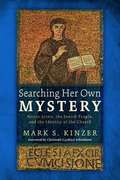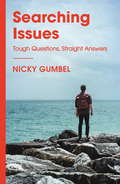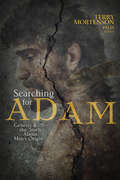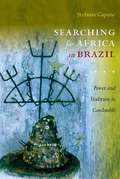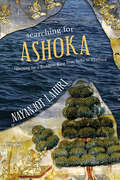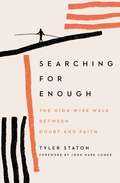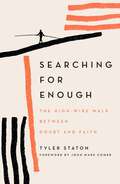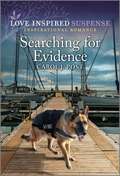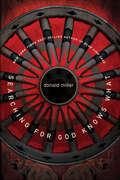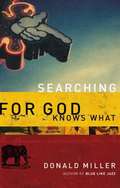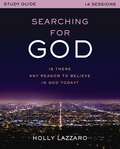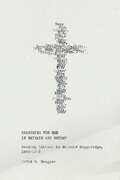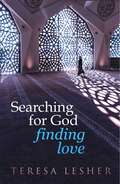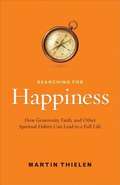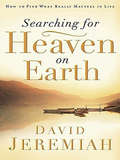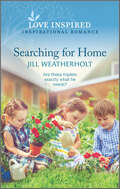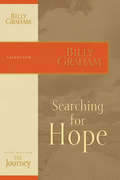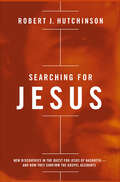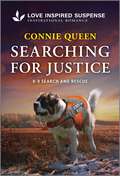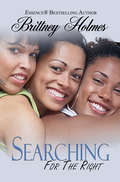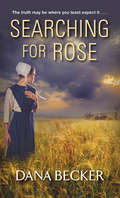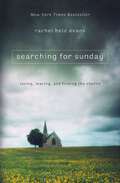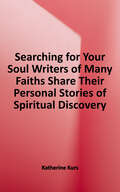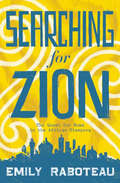- Table View
- List View
Searching Her Own Mystery: Nostra Aetate, the Jewish People, and the Identity of the Church
by Mark Kinzer Jean Garrigues O.P.According to Mark Kinzer, Messianic Jewish scholar and Rabbi, in Searching Her Own Mystery, "Vatican II's Declaration on the Relation of the Church to Non-Christian religions (Nostra Aetate) transformed the Catholic view of the Jewish people and the Jewish religious tradition." He notes "that the Church discovers her link to the 'stock of Abraham' when 'searching her own mystery.'" Further. he asserts that "Nostra Aetate intimated that the mystery of Israel is inseparable from the mystery of the Church. As interlocking mysteries, each community requires the other in order to understand itself." In his book, Kinzer argues "that the Church has yet to explore adequately the implications of Nostra Aetate for Christian self-understanding. The new Catholic teaching concerning Israel should produce fresh perspectives on the entire range of Christian theology, including Christology, ecclesiology, and the theology of the sacraments." To this end, "Kinzer proposes an Israel-ecclesiology rooted in Israel-Christology in which a restored ecclesia ca circumcisione--the 'church from the circumcision'--assumes a crucial role as a sacramental sign of the Church's bond with the Jewish people and genealogical-Israel's irrevocable election." In short, Kinzer, in this Searching Her own Mystery, discusses differences and similarities between Judaism and Catholicism, and hopes that this discussion will further repair the schism that exists between these different cultures and traditions. His aim is to reconcile the two religions and make each of them realize that they need each other and are interconnected. His book is replete with footnotes that he uses to couch and support his ideas and arguments.
Searching Issues: Tough Questions, Straight Answers (ALPHA BOOKS)
by Nicky GumbelAs we begin to think more deeply about the meaning of life, it's not long before we come across tough questions that deserve careful consideration. This book explores and discusses seven common objections to the Christian faith, including:- Why does God allow suffering?- What about other religions?- Is there a conflict between science and Christianity?Drawing on several years of talking through these issues with people looking for answers, Nicky Gumbel offers clear, accessible and reasoned responses to the questions that surround faith and Christianity in the modern world. He goes beyond the logic of each question and applies it to a wider understanding of God's identity and our own identity, with practical suggestions for dealing with these issues in everyday life.'Gumbel's combination of humour, anecdote, metaphysics, quotations from the Bible and complex theology are both persuasive and compelling.' - The Observer
Searching for Adam: Genesis & the Truth About Man's Origin
by Dr Terry MortensonThough there are a growing number of books out on Adam, this one is unique with its multi-author combination of biblical, historical, theological, scientific, archaeological, and ethical arguments in support of believing in a literal Adam and the Fall. A growing number of professing evangelical leaders and scholars are doubting or denying a literal Adam and a literal Fall, which thereby undermines the gospel of Jesus Christ, the Last Adam, who came to undo the damaging consequences of Adam's sin and restore us to a right relationship with our Creator. This book is increase your confidence in the truth of Genesis 1-11 and the gospel! Enhance your understanding pertaining to the biblical evidence for taking Genesis as literal history Discover the scientific evidence from genetics, fossils, and human anatomy for the Bible's teaching about Adam Understand the moral, spiritual, and gospel reasons why belief in a literal Adam and Fall are essential for Christian orthodoxy
Searching for Africa in Brazil: Power and Tradition in Candomblé
by Stefania CaponeSearching for Africa in Brazil is a learned exploration of tradition and change in Afro-Brazilian religions. Focusing on the convergence of anthropologists' and religious leaders' exegeses, Stefania Capone argues that twentieth-century anthropological research contributed to the construction of an ideal Afro-Brazilian religious orthodoxy identified with the Nag (Yoruba) cult in the northeastern state of Bahia. In contrast to other researchers, Capone foregrounds the agency of Candombl leaders. She demonstrates that they successfully imposed their vision of Candombl on anthropologists, reshaping in their own interest narratives of Afro-Brazilian religious practice. The anthropological narratives were then taken as official accounts of religious orthodoxy by many practitioners of Afro-Brazilian religions in Brazil. Capone draws on ten years of ethnographic fieldwork in Salvador de Bahia and Rio de Janeiro as she demonstrates that there is no pure or orthodox Afro-Brazilian religion. Challenging the usual interpretations of Afro-Brazilian religions as fixed entities, completely independent of one another, Capone reveals these practices as parts of a unique religious continuum. She does so through an analysis of ritual variations as well as discursive practices. To illuminate the continuum of Afro-Brazilian religious practice and the tensions between exegetic discourses and ritual practices, Capone focuses on the figure of Exu, the sacred African trickster who allows communication between gods and men. Following Exu and his avatars, she discloses the centrality of notions of prestige and power--mystical and religious--in Afro-Brazilian religions. To explain how religious identity is constantly negotiated among social actors, Capone emphasizes the agency of practitioners and their political agendas in the "return to roots," or re-Africanization, movement, an attempt to recover the original purity of a mythical and legitimizing Africa.
Searching for Ashoka: Questing for a Buddhist King from India to Thailand
by Nayanjot LahiriReveals how the persona of India's most famous emperor was constantly reinvented in ancient times to suit a variety of social visions, political agendas, and moral purposes.Blending travelogue, history, and archaeology, Searching for Ashoka unravels the various avatars of India's most famous emperor, revealing how he came to be remembered-and forgotten-in distinctive ways at particular points in time and in specific locations. Through personal journeys that take her across India and to various sites and cities in Sri Lanka, Myanmar, and Thailand, archaeologist Nayanjot Lahiri explores how Ashoka's visibility from antiquity to the modern era has been accompanied by a reinvention of his persona. Although the historical Ashoka spoke expansively of his ideas of governance and a new kind of morality, his afterlife is a jumble of stories and representations within various Buddhist imaginings. By remembering Ashoka selectively, Lahiri argues, ancient kings and chroniclers created an artifice, constantly appropriating and then remolding history to suit their own social visions, political agendas, and moral purposes.
Searching for Enough: The High-Wire Walk Between Doubt and Faith
by Tyler StatonA unique and validating look at the tension you feel between disillusionment and a desire for truth, Searching for Enough helps you see your doubt not as an emotion to fear but as an invitation to be followed.Do you ever find yourself thinking, "I'm not enough, and I'm never going to be. And I know I'm not supposed to say this, but God's not enough for me either." Whether or not we attend church, deep down we wonder if the biblical story of faith is really enough for the complexity of the world in which we live. We fill our lives with other things, hoping that maybe the next experience or accomplishment will complete us. Yet with every goal we reach, we still feel discouraged and anxious.In Searching for Enough, Pastor Tyler Staton draws on ancient and modern insights to introduce us, as if for the first time, to Jesus' disciple Thomas: history's most notorious skeptic. Like Thomas, we are caught between two unsatisfying stories: We want to believe in God but can't reconcile his presence with our circumstances and internal struggles.But what if there's a better story than shame? What if there's redemption so complete that there's nothing left to hide? What if there is a God who can heal your resentments, fears, and loneliness in such a profound way that you feel whole?From a place of spiritual companionship and deep authenticity, Tyler shows us that it is not an empty tomb that will change our lives, but the presence of the living God. Whether you are a distant skeptic, an involved doubter, or a busy but bored Christian, Searching for Enough invites you to find enough in a God who offers the only promises that never disappoint.
Searching for Enough: The High-Wire Walk Between Doubt and Faith
by Tyler StatonDo you ever find yourself thinking, 'I'm not enough, and I'm never going to be. And I know I'm not supposed to say this, but God's not enough for me either.'Whether or not we attend church, deep down we wonder if the biblical story of faith is really enough for the complexity of the world in which we live. We fill our lives with other things, hoping that maybe the next experience or accomplishment will complete us. Yet with every goal we reach, we still feel discouraged and anxious.In Searching for Enough, Pastor Tyler Staton draws on ancient and modern insights to introduce us, as if for the first time, to Jesus' disciple Thomas: history's most notorious sceptic. Like Thomas, we are caught between two unsatisfying stories: we want to believe in God but can't reconcile his presence with our circumstances and internal struggles.But what if there's a better story than shame? What if there's redemption so complete that there's nothing left to hide? What if there is a God who can heal your resentments, fears, and loneliness in such a profound way that you feel whole?From a place of spiritual companionship and deep authenticity, Tyler shows us that it is not an empty tomb that will change our lives, but the presence of the living God. Whether you are a distant skeptic, an involved doubter, or a busy but bored Christian, Searching for Enough invites you to find enough in a God who offers the only promises that never disappoint.
Searching for Evidence (Canine Defense #1)
by Carol J. PostWith his K-9 partner&’s help, can he save an innocent life? K-9 officer Jared Miles stumbles upon a crime scene on his day off and believes Kassie Ashbaugh is the victim of a random attack. However, as threats on her life continue, he realizes that Kassie is in grave danger. Her father's abandoned boat suggests foul play, and Jared suspects someone is after Kassie for something her missing father is hiding. Can Jared unravel the mystery before unknown enemies catch her?From Love Inspired Suspense: Courage. Danger. Faith.Canine Defense Book 1: Searching for Evidence
Searching for God Knows What
by Donald Miller Don MillerWith equal parts wit and wisdom, New York Times bestselling author Donald Miller invites you to reconnect with your faith. Miller shares what he's learned firsthand--that our relationship with God is designed to teach us about redemption, grace, healing, and so much more.Searching for God Knows What weaves together timeless stories and fresh perspectives on the Bible to capture one man's journey to discover an authentic faith that's worth believing.Along the way, Miller poses his own questions about faith, religion, and community, asking: What if the motive behind our theology was relational?What if our value exists because God takes pleasure in us?What if the gospel of Jesus is an invitation to know God?Maybe you're a Christian wondering what faith you signed up for. Or maybe you don't believe anything and are daring someone to show you a genuine example of genuine faith. Somewhere beyond the self-help formulas, fancy marketing, and easy promises, there is a life-changing experience with God waiting for you--it just takes a little bit of searching.Praise for Searching for God Knows What:"Like a shaken snow globe, Donald Miller's newest collection of essays creates a swirl of ideas about the Christian life that eventually crystallize into a lovely landscape...[He] is one of the evangelical book market's most creative writers." --Christianity Today"If you have felt that Jesus is someone you respect and admire--but Christianity is something that repels you--Searching for God Knows What will give you hope that you still can follow Jesus and be part of a church without the trappings of organized religion." --Dan Kimball, author of The Emerging Church and Pastor of Vintage Faith Church, Santa Cruz, CA"For fans of Blue Like Jazz, I doubt you will be disappointed. Donald Miller writes with the wit and vulnerability that you expect. He perfectly illustrates important themes in a genuine and humorous manner...For those who would be reading Miller for the first time, this would be a great start." --Relevant
Searching for God Knows What
by Donald MillerIn Searching for God Knows What, Donald Miller's provocative and funny book, he shows readers that the greatest desire of every person is the desire for redemption. Every person is constantly seeking redemption (or at least the feeling of it) in his or her life, believing countless gospels that promise to fix the brokenness. Typically their pursuits include the desire for fulfilling relationships, successful careers, satisfying religious systems, status, and escape. Miller reveals how the inability to find redemption leads to chaotic relationships, self-hatred, the accumulation of meaningless material possessions, and a lack of inner peace. Readers will learn to identify in themselves and within others the universal desire for redemption. They will discover that the gospel of Jesus is the only way to find meaning in life and true redemption. Mature believers as well as seekers and new Christians will find themselves identifying with the narrative journey unfolded in the book, which is simply the pursuit of redemption. "Miller ... writes on faith with candor and passion reminiscent of Frederick Buechner and Anne Lamott. "The Oregonian" Like a shaken snow globe, Donald Miller's newest collection of essays creates a swirl of ideas about the Christian life that eventually crystallize into a lovely landscape . . . [He] is one of the evangelical book market's most creative writers. " -Christianity Today"For fans of Blue Like Jazz, I doubt you will be disappointed. Donald Miller writes with the wit and vulnerability that you expect. Sharing stories of his upbringing and his journey in more recent years, he perfectly illustrates important themes in a genuine and humorous manner . . . For those who would be reading Miller for the first time, this would be a great start. -Relevant"Whenever people ask me about Donald Miller, I notice the first thing I say is, 'That guy can write. ' Having met Don, I also know he seeks to live what he writes, or better said, he writes what he lives. That, I think, is the top credential for a person who writes about ultimate concerns-spirituality, meaning, purpose, life, God, and joy. In Searching for God Knows What, you'll find more of his great writing, honest feeling, and spiritual insight to help you on your journey. -Brian McLaren Pastor, Author-www. anewkindofchristian. com
Searching for God Study Guide: Is There Any Reason to Believe in God Today?
by Holly LazzaroIn this 6-session, video-based study guide (DVD/streaming video sold separately) some of today's greatest Christian thinkers and apologists explore many of the most important questions about Christianity and what it has to offer the world today.What is Christianity and how is it unique among worldviews?What are some of the ideas that have influenced the way people think about it?Is there any evidence for God?Why does the resurrection matter? Many people in today's culture hold a wide variety of ideas about religion in general and Christianity in particular, some of which stem from distorted views and misunderstandings that the church can respond well to if it's well equipped.The Searching for God Study Guide will draw you and your small group into a close look at the Christian faith and how it makes better sense of the universe and human nature than two of the most common non-Christian theories: naturalism and relativism. It then examines the central event in the Christian story, the resurrection of Jesus Christ, and how to make a strong defense of this event.Holly Lazzaro expertly leads participants into deeper reflection on the insights provided in the video study by top scholars such as Lee Strobel, William Lane Craig, Gary Habermas, J. Warner Wallace, Nabeel Qureshi, Paul Copan, and many more.This video-based study is designed to be experienced in a group setting or any small gathering and includes video teaching notes, group discussion questions, personal reflections, and Scripture readings.Searching for God Video Study (025986100711) sold separately.
Searching for God in Britain and Beyond: Reading Letters to Malcolm Muggeridge, 1966–1982
by David G. ReaglesWhen writer and media personality Malcolm Muggeridge unexpectedly converted to Christianity in the 1960s, fans around the world flocked to his devotional writings and television programs about his spiritual journey. Because Muggeridge was critical of institutional Christianity and initially refused to join a church, he inspired a special affinity in those who were disillusioned with mainstream religious authority. Readers from around the world sent him deeply personal letters describing their spiritual and religious lives, revealing their anxieties, doubts, and hopes about the future of Christianity.In Searching for God in Britain and Beyond David Reagles draws on nearly two thousand of these remarkable fan letters to explore the thoughts and feelings of ordinary Christians in a time of cultural and religious upheaval. In these candid letters, Muggeridge’s correspondents wrestled with their experiences of faith and doubt, the value of institutional religion, uncertainties about permissiveness in society, the proper role of Christian social activism, and the forces of secularism. For these fans and skeptics alike, reading and writing were a vital means of working out their religious identities and convictions amid the supposed decline of Christendom.Searching for God in Britain and Beyond provides a rare and fascinating glimpse into the inner worlds of ordinary Christians in the 1960s and 1970s, revealing how the secularization of postwar society felt to average people.
Searching for God, Finding Love
by Teresa Lesher&“Searching for God not only offers an inspiring, emotional insight to the author's journey to and through Islam, it beautifully maps out Islamic principles in an understandable and relatable way. Truly a five-star read!&”- Ameena Blake, Muslim scholar, UK&“A story of a Christian who always carried Islam – unknowingly – in her heart until she finally discovered it, then artistically crafted her experience with a feather. Rarely does a book touch my heart and inspire me like that.&”- Fadel SolimanBridges' Translation of the Ten Qira'at of the Noble Quran &“One of my earliest memories is of contemplating God. I was a freckle-faced girl of five, sitting quietly in catechism class when the teacher casually said, &‘God is bigger than everything.' The words hit me like a blast force. The classroom disappeared, the teacher's voice muted, and I gasped at the revelation. Bigger than the tallest tree in the yard? Bigger than a mountain? Bigger than the world? The enormity of God impressed me, but I couldn't help wondering, &‘If He is bigger than anything, where is He?'&”In this inspirational memoir, Teresa Lesher shares her search for God. She explores factors that have made her who she is as well as influencers who shape who she aspires to be and who lead her in her quest for the Divine. She dissects basic concepts that have been essential for her understanding of God as well as paradigms that shape her experience of Him. She shares her journey along the Divine Path and closer to Divine Presence through expressions of submission to Him. This quest for God takes her to her innermost self and ends with a discovery of life, an understanding of love, and a commitment to truth.
Searching for Happiness : How Generosity, Faith, And Other Spiritual Habits Can Lead To A Full Life
by Martin ThielenThe key to happiness is being rich, successful, and beautiful…right? Martin Thielen, best-selling author of What's the Least I Can Believe and Still Be a Christian?, insists that this is far from the truth. Happiness, Thielen argues, does not come from external factors like getting a job promotion or finally reaching your goal weight. Rather, happiness is an inside job. <P><P>In brief, easy-to-read chapters, Thielen offers ten traits of happy and fulfilled people. Using psychological research, personal anecdotes, and Scripture, Thielen begins the path to contentment by showing how life circumstances—including income, health, physical appearance, and marital status—only account for about 10 percent of a person's overall life satisfaction. From there, he offers alternatives to the frequent methods we use to make ourselves happy. Instead of aiming to make more money, Thielen contends that expressing gratitude and cultivating optimism are surer paths to joy. Rather than focusing on constant advancement in our careers, let's practice our ability to forgive, to be generous, and to use trials as growth opportunities. These lessons, and much more, help readers who may be dissatisfied in their lives see that authentic contentment is closer than they ever imagined. <P><P>The book features a guide for group or individual study, which includes questions for reflection and a challenge for each individual to reflect on during the week.
Searching for Heaven on Earth
by David JeremiahDon't you deserve a little happiness?They are the questions that plague us:Is happiness within my reach?Why is life so frustrating?Is it too late for me?Or to put another way, "Where can I find a little heaven on earth?"History's most successful man, Solomon, wondered just that. As Dr. David Jeremiah shows us, he was a man who tested life's haunting questions head-on. And tasted life's riches full-on. And who found his answers in the last place he thought to look.Listen, then, to his voice. A voice that, if you pay attention, will speak directly to your flesh and bones and heart. A voice that admits: Maybe happiness is an empty hope. Or maybe we've simply been looking in all the wrong places. . .
Searching for Heaven on Earth Journal: How to Find What Really Matters in Life
by David JeremiahKey Bible verses, quotes from the book, reflective readings, and questions for self-discovery accompany the reader on the most crucial pilgrimage of all.
Searching for Home
by Jill WeatherholtCan three little matchmakers lasso a cowboy father? When injured professional bull rider Luke Beckett returns to his hometown to recover, he doesn&’t expect his B and B host and physical therapist to be his first and only love, Meg Brennan. He&’s also unprepared for Meg&’s adorable triplets to steal his heart. Luke&’s past has him doubting he&’s good enough for Meg and the children, but they might be just what the doctor ordered to help him heal… From Love Inspired: Uplifting stories of faith, forgiveness and hope.
Searching for Hope: The Journey Study Series
by Billy Graham"You will only make this journey once. What kind of journey will it be?" - Billy GrahamHope is defined as, "a wish or desire accompanied by confident expectation of ots fulfillment." We all need hope for today, tomorrow, and for eternity, but how can we sustain hope when life is often so difficult?God's love is the answer. If we understand this truth, it gives us hope-hope because God cares about us and wants to help us. Searching for Hope provides answers on how to find God's path to hope.The Journey Study Series is based on Billy Graham's best-selling book The journey, the culmination of lifetime of spiritual insight and ministry experience. Each chapter explores the joys, triumphs, and conflicts we all encounter on our journey through life.Use for self-study or shared experiences in small groupssix weeks of lessonssidebars offer a scriptural journey through God's wordquestions for starting group discussionsinsight-filled scripture passages to studyEach chapter includes thought-provoking questions, commentary, Scriptures, and insights to help you on life's journey. Each lesson teaches the secret of walking with God on life's path. Understanding God's truths will make life's journey easier and let Him fulfill His promise to lead you home.
Searching for Jesus: New Discoveries in the Quest for Jesus of Nazareth—and How They Confirm the Gospel Accounts
by Robert J. HutchinsonFor more than a century, Bible scholars and university researchers have been systematically debunking what ordinary Christians believed about Jesus of Nazareth. But what if the most recent Biblical scholarship actually affirmed the New Testament? What if Jesus was not a Zealot revolutionary, or a Greek Cynic philosopher, or a proto-feminist Gnostic, but precisely what he claimed to be: the divine Son of Man prophesied in the Book of Daniel who gave his life as a ransom for many? What if everything the Gospels say about Jesus of Nazareth—his words, his deeds, his plans—turned out to be true? Searching for Jesus changes &“what if?&” to &“what is,&” debunking the debunkers and showing how the latest scholarship supports orthodox Christian belief.
Searching for Justice (K-9 Search and Rescue)
by Connie QueenA cold case reopened. A K-9 in pursuit of the truth. When a teen goes missing from the same place where her own foster sister disappeared, K-9 handler Brynne Taylor is on the case…until she&’s caught in a lethal trap. Someone doesn&’t want her or her Saint Bernard, Fergie, snooping around, and they&’re willing to kill to keep their secrets. Saved by rancher Jace Jackson, Brynne reluctantly accepts the single father&’s help solving both cases. But they&’re under fire every dangerous step of the way—and eluding this killer may be as impossible as outrunning Brynne&’s past…From Love Inspired Suspense: Courage. Danger. Faith.K-9 Search and Rescue Book 1: Desert Rescue by Lisa PhillipsBook 2: Trailing a Killer by Carol J. PostBook 3: Mountain Survival by Christy BarrittBook 4: Search and Defend by Heather WoodhavenBook 5: Following the Trail by Lynette EasonBook 6: Dangerous Mountain Rescue by Christy BarrittBook 7: Wilderness Hunt by Lisa PhillipsBook 8: Alaskan Mountain Search by Sarah VarlandBook 9: Alaskan Avalanche Escape by Darlene L. TurnerBook 10: Tracking Stolen Treasures by Lisa PhillipsBook 11: Alaskan Wilderness Rescue by Sarah VarlandBook 12: Lethal Mountain Pursuit by Christy BarrittBook 13: Tracking the Missing by Sami A. AbramsBook 14: K-9 Alaskan Defense by Sarah VarlandBook 15: Searching for Justice by Connie Queen
Searching for Right
by Brittney HolmesLauren, Jayda, Danielle, and Brenda are finishing their senior year of high school. They seem to have perfect lives, but these girls have more to worry about than finals and college applications. Lauren has an inextinguishable infatuation with her history teacher, and she will do whatever it takes to get what she wants, even if it means hurting herself, her friends, or someone who truly loves her. As she plans to celebrate her eighteenth birthday, she concentrates her attention on making it one she'll always remember. Jayda has the closest relationship with Lauren, but even she can't sway her friend from making decisions she will regret. Besides, she has her own problems. With her parents' marriage in turmoil, she has to be the backbone of her family. Can she balance that with her new love interest, who comes from a completely different background than she does? Danielle's a single mother who has enough on her plate without having to deal with her pessimistic mother always telling her that she can do nothing right. When she makes a new friend, he brings a breath of fresh air into her life. With his help, she's making strides to become the woman she's always hoped to be. Brenda is the brainiac of the foursome, but doesn't seem to be very smart when it comes to men. When she messes up something good with a great guy, she realizes where her problems lie and confronts her mother head-on.These young women on the brink of adulthood are struggling to handle their issues. As God is introduced to them in unusual ways, they find themselves on a journey they'll never forget.
Searching for Rose
by Dana BeckerCourageous and vulnerable, April has survived Philadelphia&’s tough city streets. But when her sister disappears, April&’s search will lead her to the Pennsylvania Amish countryside—where the peaceful setting belies a brand of danger all its own . . . With a childhood shattered by alcoholism and abandonment, April learned the hard way to trust only herself and her younger sister, Rose. But suddenly, Rose is gone without a word—and April&’s purpose in life is to find her. She has only one ally: Joseph Young, a handsome Amish man with whom she&’s struck up an unlikely flirtation in the bakery where she works. He&’s knowledgeable, steadfast—and when they join forces, April&’s life takes a radical turn . . . In the heart of Amish farm country, April and Joseph grow closer. Yet April fears there&’s no future for them. Especially when vicious, too-personal warnings and strange attacks make her wonder just whom Joseph is really trying to protect. And as her unconventional investigation roils a community with much to conceal, April will find some secrets are killer—and some dreams may be too lethal to trust . . .
Searching for Sunday: Loving, Leaving, and Finding the Church
by Rachel Held EvansNew York Times bestselling author Rachel Held Evans embarks on a quest to find out what it really means to be part of the Church. Like millions of her millennial peers, Rachel Held Evans didn't want to go to church anymore. The hypocrisy, the politics, the gargantuan building budgets, the scandals; church culture seemed so far removed from Jesus. Yet, despite her cynicism and misgivings, something kept drawing her back to Church. <P><P>And so she set out on a journey to understand Church and to find her place in it. Centered around seven sacraments, Evans' quest takes readers through a liturgical year with stories about baptism, communion, confirmation, confession, marriage, vocation, and death that are funny, heartbreaking, and sharply honest. <P><P>A memoir about making do and taking risks, about the messiness of community and the power of grace, Searching for Sunday is about overcoming cynicism to find hope and, somewhere in between, Church. <P><b>A New York Times Bestseller</b>
Searching for Your Soul: Writers of Many Faiths Share their Personal Stories of Spiritual Discovery
by Katherine KursReflections on the importance of religion include contributions by such authors as Margot Adler, Rita Dove, Mary Gordon, James McBride, Kathleen Norris, and Malcolm X.
Searching for Zion: The Quest for Home in the African Diaspora
by Emily RaboteauFrom Jerusalem to Ghana to Katrina-ravaged New Orleans, a woman reclaims her history in a &“beautifully written and thought-provoking&” memoir (Dave Eggers, author of A Hologram for the King and Zeitoun). A biracial woman from a country still divided along racial lines, Emily Raboteau never felt at home in America. As the daughter of an African American religious historian, she understood the Promised Land as the spiritual realm black people yearned for. But while visiting Israel, the Jewish Zion, she was surprised to discover black Jews. More surprising was the story of how they got there. Inspired by their exodus, her question for them is the same one she keeps asking herself: have you found the home you&’re looking for? In this American Book Award–winning inquiry into contemporary and historical ethnic displacement, Raboteau embarked on a ten-year journey around the globe and back in time to explore the complex and contradictory perspectives of black Zionists. She talked to Rastafarians and African Hebrew Israelites, Evangelicals and Ethiopian Jews—all in search of territory that is hard to define and harder to inhabit. Uniting memoir with cultural investigation, Raboteau overturns our ideas of place, patriotism, dispossession, citizenship, and country in &“an exceptionally beautiful . . . book about a search for the kind of home for which there is no straight route, the kind of home in which the journey itself is as revelatory as the destination&” (Edwidge Danticat, author of The Farming of Bones).
